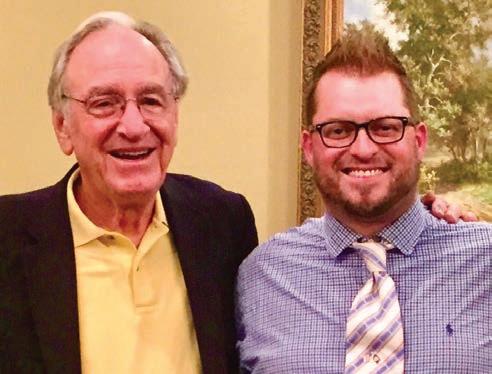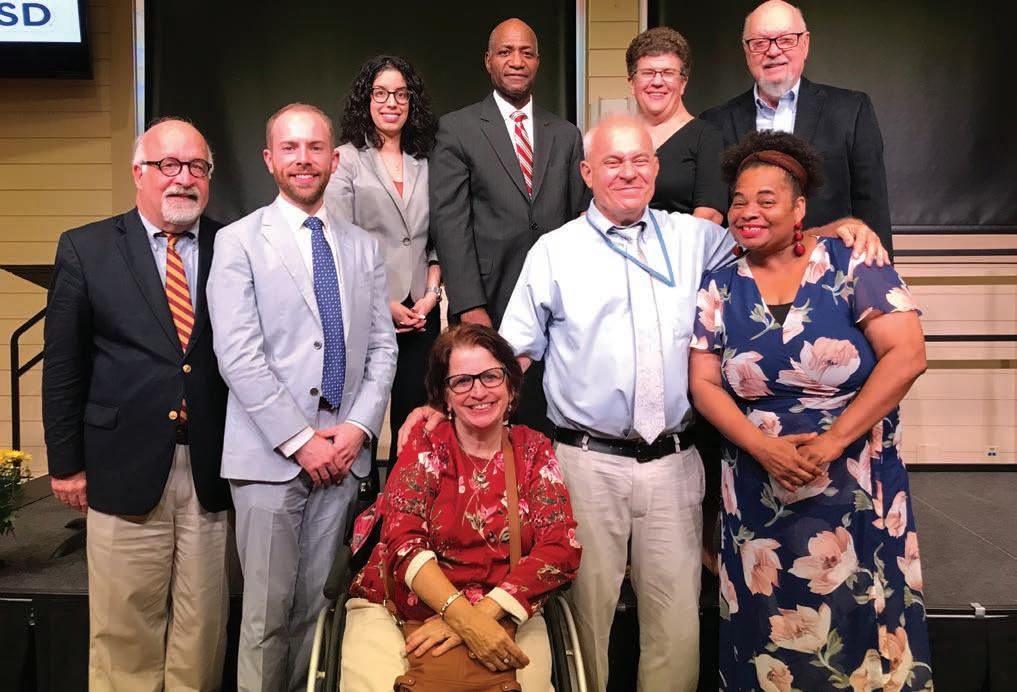
5 minute read
Engage and Educate: How DGM Woke Me Up
The Center on American Progress stated in The State of Civics Education:
“Civic knowledge and public engagement is at an all-time low. A 2016 survey by the Annenberg Public Policy Center found that only 26 percent of Americans can name all three branches of government, which was a significant decline from previous years. Not surprisingly, public trust in government is at only 18 percent and voter participation has reached its lowest point since 1996. Without an understanding of the structure of government; rights and responsibilities; and methods of public engagement, civic literacy and voter apathy will continue to plague American democracy. Educators and schools have a unique opportunity and responsibility to ensure that young people become engaged and knowledgeable citizens.”
Advertisement
In late 2015, Deaf Grassroots Movement (DGM) and Wesley Arey, quite the animated character that he is, began popping up in my feed on Facebook. He ranted about many issues that I could relate to being a Deaf person living in an auditory-based society that largely fails to embrace our diversity. A burning passion to seek out change lit up in me. I came to the realization that I should do something. I started reading up on other Deaf people that shared similar experiences I had, other trending obstacles in the Deaf community, negative policies, legislation, and I delved into politics more than ever before.
DGM opened my eyes to see the need for Deaf leaders. I stopped taking my rights for granted. It is true, participation lies at the core of any democratic society. My belief for the reason of the disconnection from the political process by those in the Deaf community demographic is either due to plain ignorance, lack of equitable access to critical information, or even a missed opportunity to receive the most basic civics course in previous educational settings. Corey Axelrod, Founder and CEO of 2axend, wrote in a 2017 article:
Jay Isch with Fmr. Senator Tom Harkin of Iowa at a Louisiana Democratic Party fundraiser in 2019.
“72% of Deaf People will not vote for inaccessible candidates running for public office”
How do we fix this? Collectively, we all must share common ground focusing on issues that negatively impact us as a group by looking past the political differences and the systemic ignorance for the sake of our own existence. The disconnection is the fault of a system that failed to embrace us, understand us or even accommodate our unique educational needs. This is why we must engage and educate.
Voter turnout levels in proximity of model schools for the deaf in progressive cities tend to be higher than those in rural or southern ones. A variety of explanations, including a stronger sense of community, stronger political organizations and traditions, as well as an older population have been put forward. The lack of participation by so many people, including our own, distorts the results in any election and the politicians must implement innovative means to overcome this growing trend. This is why we must engage and educate.
It all begins with education. Deaf Education, as perceived by our own Deaf education experts, often is regarded as inefficient or not inclusive enough. The reason lies in a fundamental misunderstanding of our deafness in government. Generally, society views deafness as a deficiency rather than a separate linguistic context, worldview and culture, and not as a capable group with so-called “normal” intelligence. There has been a controversy within Deaf Education for the last 140 years. Why? Ignorance divides and conquers us, but that’s a whole other conversation. This is why we must engage and educate.
I am forever grateful for the inspiration from DGM for encouraging leaders who improved society. It is heartening to observe the sheer excitement of people who are getting involved or even voting for the first time in an election, be it for the city council, state legislature, U.S. Congress, or for the presidency. Can you imagine if there were many more of us involved in politics? We would be making monumental progress together. This is why movements like DGM play an important role in our community to remind us that complacency in politics is something we, as the Deaf community, simply cannot afford. This is why we must engage and educate.
In conclusion, it is important to remember that we are a small minority group, we all need each other, and we do not have the luxury to not engage and educate. Hopefully, the state of our current affairs will act as a wake-up call to many of us to participate in the democratic process and to contribute to a better society for all of us.
Jay Isch is Deaf, Deaf-bred and Deaf-educated in the northeast, a passionate award-winning Deaf advocate in the deep south with a continuing successful record in progressive systemic changes as a leading DGM activist, and as a Governor-appointed Commissioner for the Deaf, as well as being Deafinitely loud. For more on Jay, visit www.deaffocus.org.
Mobile. User-friendly.
Use Sprint IP Relay while on the go. Made for people who are deaf, deafblind, hard of hearing or have a speech disability.
n Automated registration and identity verification n One 10-digit number access for Sprint IP Relay n Ability to change the font size, font and background color n Ability to convert web or mobile app to Spanish n Ability to receive Text Mail n Ability to copy & email conversations
sprintrelay.com/iprelay


Ensuring equal access and opportunity for Deaf and Hard-of-Hearing Americans
BY ZAINAB ALKEBSI
DHHCAN, established in 1993, serves as the coalition of organizations representing the interests of deaf and/or hard of hearing citizens in public policy and legislative issues relating to rights, quality of life, equal access, and self-representation. DHHCAN provides a forum for proactive discussion on issues of importance, such as education, employment, transportation, housing, telecommunications, and more.
Ahead of the 2020 election primaries, DHHCAN submitted a proposal to all 2020 presidential candidates – those whose campaigns were active at the time of submission – to ensure equal access and opportunity for deaf, hard of hearing, latedeafened, DeafBlind, and deaf-mobile disabled Americans. Refer to the next page for a list of all the organizations that participated in this effort. DHHCAN respectfully invited all the presidential campaigns to actively participate with us during the 2020 election cycle in a bipartisan dialogue and exchange of information, with the ultimate goal of improving the quality of life for all Americans. During the campaigns, many deaf and hard of hearing Americans will attend town hall meetings and rallies across the nation, and we reminded the campaigns to provide accessible services at







